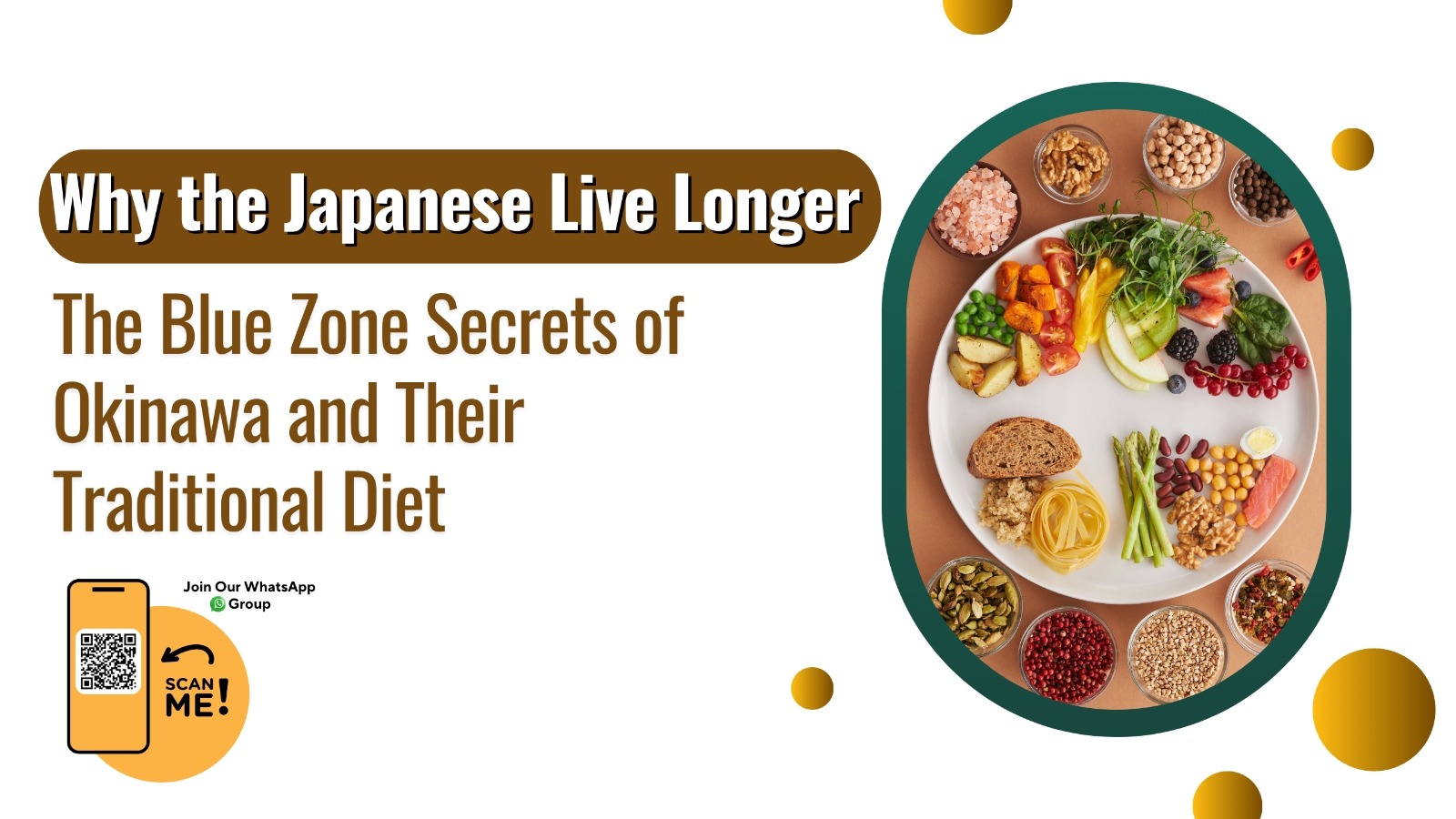In a quiet village in Okinawa, Japan, 100-year-olds still tend gardens, prepare miso soup from scratch, and laugh with friends under blooming cherry trees. They don’t chase youth—they embrace a way of life that makes growing old vibrant and graceful.
Okinawa is one of the world’s celebrated Blue Zones—regions where people live significantly longer, healthier lives. While Japan boasts one of the world’s highest life expectancies (over 84 years on average), it’s in Okinawa that the secrets of natural longevity are most deeply rooted.
So, what makes Okinawan and Japanese elders live not just longer—but better? The answer lies in their lifestyle, mindset, and especially their food.
🌏 What Are Blue Zones?
Blue Zones are regions identified by author and explorer Dan Buettner, where people consistently live past 90 or 100 years with exceptionally low rates of chronic illness. There are five:
- Okinawa, Japan
- Sardinia, Italy
- Nicoya Peninsula, Costa Rica
- Ikaria, Greece
- Loma Linda, California (Adventist community)
While diverse in location and culture, these zones share common threads: purpose-driven lives, strong social connections, daily movement, and most notably, nutrient-dense diets.
🏮 The Okinawan Way: Why They Live So Long
Among the Blue Zones, Okinawa stands out not just for longevity, but for thriving centenarians who maintain clarity, mobility, and joy. Here are the key factors that contribute to their remarkable healthspan:
🎯 1. Ikigai – A Deep Sense of Purpose
In Okinawa, everyone—regardless of age—has an “ikigai” (生き甲斐), meaning “a reason to live.” Whether it’s gardening, caring for grandchildren, or practicing traditional crafts, this sense of purpose fuels both mental and physical health.
👨👩👧👦 2. Moai – Lifelong Social Circles
Okinawans build and maintain moai, small groups of lifelong friends who provide emotional, financial, and social support. This culture of belonging reduces stress and creates safety nets in every stage of life.
🧘 3. Stress Reduction Through Ritual
Spiritual practices, daily gratitude, and a slower pace of life help manage stress. Many elders pray, tend family altars, or simply sit in silence before meals. This contributes to lower inflammation and improved cardiovascular health.
🏃 4. Daily Natural Movement
There’s no need for intense workouts. Instead, movement is embedded in daily life—walking to the market, gardening, or squatting on tatami mats. Elders move with purpose and flexibility into their 90s.
🍱 The Traditional Okinawan Diet: Food as Preventive Medicine
The Okinawan diet is plant-rich, low in calories, and deeply tied to seasonal, local produce. It’s considered one of the healthiest eating patterns in the world. Here’s why:
🌿 1. Plant-Based and Nutrient-Dense
Staples include:
- Purple sweet potatoes – rich in antioxidants and complex carbs
- Goya (bitter melon) – believed to balance blood sugar and cool the body
- Tofu and legumes – offering plant-based protein
- Seaweed – high in iodine, calcium, and fiber
- Green leafy vegetables, daikon, turmeric, and mushrooms
Fish and meat are eaten occasionally and in small amounts—often as a condiment, not the main dish.
🍵 2. Fermented Foods and Tea Culture
- Miso soup, natto, and tsukemono (pickled vegetables) nourish the gut and support immunity.
- Green tea, especially jasmine and matcha, is enjoyed daily for its anti-inflammatory and antioxidant benefits.
📏 3. Hara Hachi Bu – Eating Until 80% Full
Okinawans follow the Confucian wisdom of “Hara Hachi Bu,” which encourages stopping when 80% full. This habit:
- Prevents overeating
- Regulates metabolism
- Reduces oxidative stress on cells
🌸 4. Seasonal, Mindful, and Beautiful Meals
Meals are thoughtfully plated with variety in color, texture, and taste. Eating is slow, communal, and respectful—every meal begins with “Itadakimasu” (a phrase of gratitude). This ritualistic approach nurtures not only the body, but also the mind and spirit.
🌿 What You Can Learn (and Practice) from Okinawa
Even if you don’t live in a Blue Zone, you can adopt these habits:
Okinawan Habit | How to Start Today |
Eat more plants | Add one plant-based meal per day |
Hara Hachi Bu | Pause before finishing your plate |
Build a Moai | Reconnect with old friends or join a hobby group |
Practice Ikigai | Journal about what gives your life meaning |
Daily movement | Walk, garden, or practice yoga gently |
Drink tea & eat fermented food | Swap soda for green tea; try kimchi, miso, or yogurt |
🧘 Final Thoughts: A Long Life, Fully Lived
The Japanese—especially the Okinawans—don’t chase longevity with fads or expensive regimes. They live long because they live lightly, meaningfully, and together. Their lives are not marked by excess, but by balance.
In a fast world, Okinawa teaches us to slow down.
To savor miso soup under a cherry blossom tree.
To call a friend just because.
To walk, eat, rest, and work with care and purpose.
Maybe the real secret to living longer… is learning how to live better.


